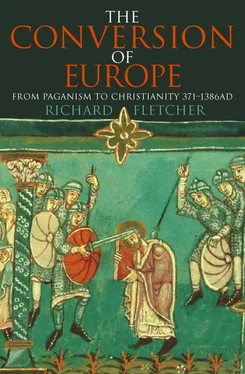We know very little of the earlier life of the man chosen by Gregory to head the mission of King Ethelbert. Augustine of Canterbury – named after the great Augustine of Hippo – was a monk and by 596 prior of the monastery founded by Gregory in Rome. Although the prior is formally second-in-command of a monastery after the abbot, in this instance he would have been effectively running the community because its abbot would have been too busy with his duties as pope to supervise the day-to-day life of the house. Gregory was a shrewd judge of men and we must assume that he thought very highly of Augustine to have appointed him to a position of considerable spiritual and administrative responsibility. Gregory commended Augustine’s knowledge of scripture in a letter to Ethelbert in 601. It is not surprising, given Gregory’s priorities, that he should have picked a man of distinguished intellect in that particular field of study to head the mission. That is all we know of Augustine before the departure of the mission in 596. We are left wondering what additional talents or experience he might have possessed which commended him to Gregory for the task of barbarian evangelization. Had he, for instance, assisted or advised the pope in his dealings with the Lombards? Possibly: as so often, we simply do not know. But we do know one thing for certain about the mission: it was big and it was well equipped. Canterbury tradition recalled that Augustine’s companions had numbered ‘about forty’ – a prodigious number. We do not know what they brought to England on the initial journey, but we do know that Gregory reinforced them in 601 with at least four more men, together with vestments, altar cloths, church plate and ornaments, relics and ‘numerous books’. Gregory could command resources well beyond the capabilities of, say, Patrick.
Augustine reached Kent in the spring or early summer of 597. Ethelbert was hesitant at first but did in time consent to be baptized. (We are as uncertain of the exact date of his baptism as we are of that of Clovis.) On 20 July 598 Gregory wrote to the patriarch of Alexandria: in his letter he reported, among other matters, that he had heard from Augustine that ‘at Christmas last more than 10,000 Englishmen had been baptised’. 11 Whether or not we wish to take the figure with a pinch of salt, we can surely accept that a large number of converts had been made. The scale of the thing is what is significant. It is incredible that so many could have been baptized had their king not given a lead. Therefore we may infer that Ethelbert had been baptized a Christian before 25 December 597. What did it mean for him as a king?
Flattering letters arrived from the pope, skilful as ever in handling barbarians. 12 Ethelbert was numbered among the ‘good men raised up by almighty God to be a ruler over nations’. Gregory played on a Germanic king’s lust for fame. ‘For He whose honour you seek and maintain among the nations will also make your glorious name still more glorious even to posterity.’ (How right he was.) Let Ethelbert be zealous for the faith ‘like Constantine … [who] transcended in renown the reputation of former princes.’ In his letter to Bertha he compared her to Helena, mother of Constantine, and assured her that her fame had come even to the ears of ‘the most serene emperor’ in Constantinople.
Ethelbert gave Augustine a church in Canterbury – another survivor – to restore as his cathedral church, which it still is. He provided Augustine with land on which to found a monastery dedicated to the apostles Peter and Paul just outside the Roman walls. This was also to be the royal mausoleum wherein he and his queen would lie entombed, prayed for and remembered until the approaching Day of Judgement about which the pope had written to him. And something started to happen at Canterbury in the wake of Ethelbert’s conversion: a Roman city began to come back to life. Bede called it, rather grandly, ‘the metropolis of his [Ethelbert’s] whole empire’. It was now a Christian city and, in Bede’s words again, ‘a royal city’.
Ethelbert’s generous endowments of his churches may have been recorded in documents drafted in Latin according to the norms of Roman conveyancing. The matter is contentious because the surviving documents are copies of a much later date whose texts have evidently been tampered with: but genuine originals probably lie behind them, the first deeds of this sort ever issued by an English ruler. What is not in doubt is that Ethelbert promulgated a code of law. In Bede’s words, much discussed and therefore translated here as literally as possible, ‘following models of the Romans he established decrees of judgements for his people with the advice of his wise men which were written down in the language of the English’. 13 These survive (in a late but reliable copy), the earliest piece of English prose. Ethelbert’s code of law is a simple tariff of offences and compensations: ‘If a man strike another on the nose with his fist, 3 shillings [shall be paid as compensation].’ There was little here that Justinian’s great jurist Tribonian would have recognized as Roman. But it was written down; it was in the king’s name; and it made new law as well as simply declaring existing custom – churchmen and church property, new arrivals on the Kentish scene, were woven into the social network of protection and compensation. The coming of Christianity gave the first impulse to the process by which the custom of the folk became the king’s law. The implications for royal authority were far-reaching.
Royal authority helped to diffuse Christianity both within Ethelbert’s kingdom of Kent and beyond it. Bede tells us that though the king did not compel any of his subjects to accept the faith, nevertheless he showed greater favour to those who did. Quite so. At another point in his narrative he let fall the information that some of Ethelbert’s subjects became Christians ‘through fear of the king or to win his favour’. A second Kentish bishopric was founded at Rochester and provided with endowments by the king. Ethelbert was also able to influence other Anglo-Saxon rulers. He might have appeared insignificant in Frankish eyes but in England Ethelbert was a considerable force, ‘a most powerful king whose supremacy reached as far as the river Humber’. Among his subject-kings was Saeberht, king of the East Saxons (i.e. Essex), who was also his nephew, the son of his sister Ricula. The East Saxons accepted Christianity and a bishopric was founded for them at London in 604. The next kingdom to the north was that of the East Angles. Its king, Redwald, was converted on a visit to Ethelbert’s court but on his return home was talked out of the sincerity of his faith by his wife. He tried to have the best of both worlds by putting up a Christian altar in his pagan temple. Ethelbert was able in addition to help the missionaries in their negotiations with the Christian clergy of neighbouring British kingdoms to the end of securing their collaboration in the work of evangelization; even though in the event these negotiations failed disastrously.
Our third princely barbarian convert was Edwin of Northumbria, baptized at York on Easter Day in the year 627, as we saw in the opening pages of this book. Here it is necessary only to emphasize that the background to Edwin’s conversion, and its aftermath, bore some likeness to the circumstances surrounding the conversions of Clovis and Ethelbert. Edwin knew something of the faith of his Christian bride before she reached him, accompanied by Paulinus – her Liudhard – in about 619. Before fighting his way to power in Northumbria in 616 Edwin had spent many years in exile; it is very probable that he had had encounters with Christians in the course of it. Later Welsh tradition claimed that part of that exile had been spent under the protection of the British King Cadfan of Gwynedd, or north-west Wales, ‘wisest and most renowned of all kings’, as his tombstone at Llangadwaladr in Anglesey described him, and certainly a Christian. Part of his exile had been spent with King Redwald of East Anglia, at whose court Edwin might have met Paulinus, as is related by the anonymous monk of Whitby in his life of Pope Gregory. Edwin’s subjects certainly included Christians, for at some date unknown he had conquered the British kingdom of Elmet, that area of south-west Yorkshire whose earlier history is still commemorated in the placenames Barwick-in-Elmet and Sherburn-in-Elmet. British tradition would claim that Edwin was actually baptized a Christian by a British bishop named Rhun, the son of King Urien of the northern British kingdom of Rheged, or Cumbria. This is unlikely. On the other hand it is highly probable that there would have been clerics among the delegations from Edwin’s sub-kingdoms who paid tributary visits to his court. Bishop Rhun could have been a not unfamiliar figure among the revellers at Edwin’s palace of, shall we say, Yeavering.
Читать дальше












